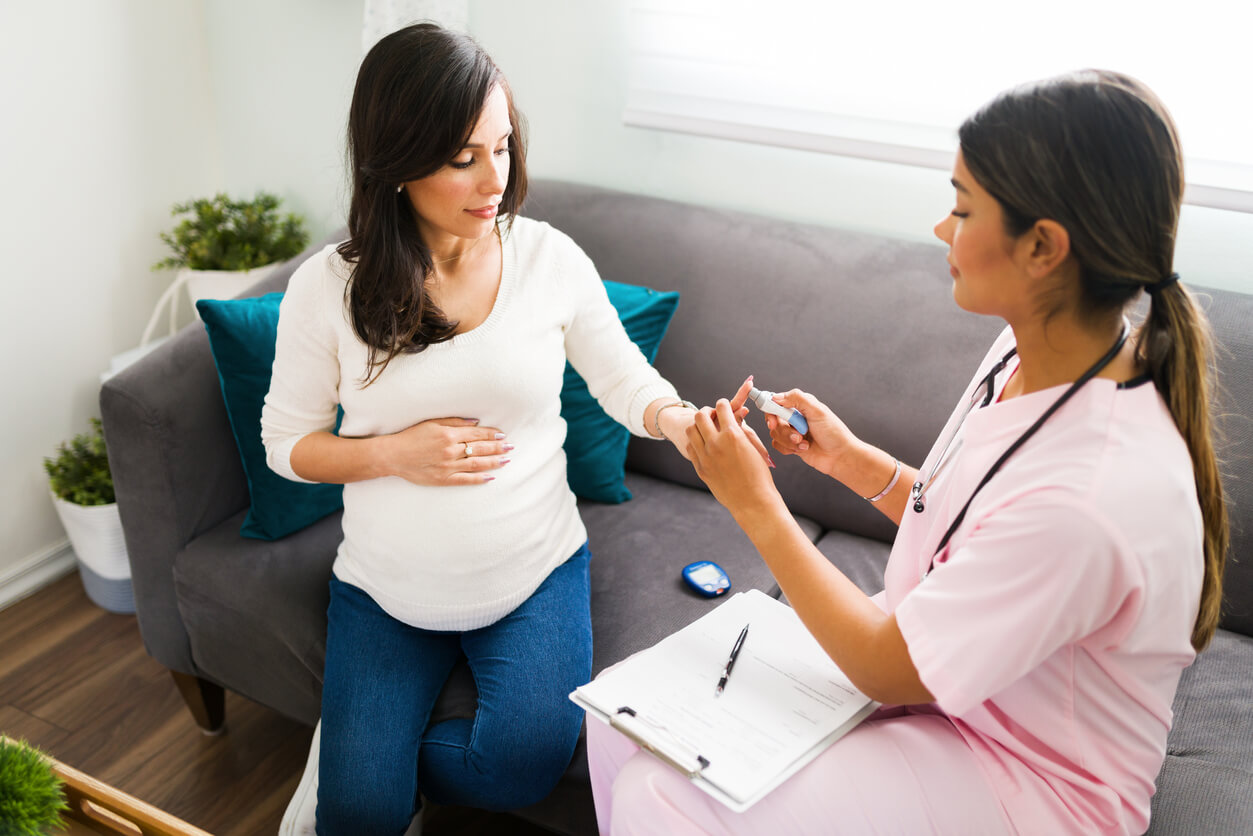Introduction
Does the mother-to-be have the following symptoms?
- Yeast infection
- Blurry vision
- Unusual weight loss
- Vomiting/ nausea
- Internal fatigue
- Immediate thirst for water
- Urinating frequently
If she has one or more symptoms from the list, she probably has gestational diabetes. However, the symptoms are not present in all mothers. Here is your ultimate guide to gestational diabetes, where you will find everything under one umbrella
How is gestational diabetes diagnosed?
Is the mother suffering from diabetes during pregnancy? If that is the case, the primary physician will test the mother between 24 to 28 weeks of fetal development. However, the diagnosis will happen early if the patient is at a higher risk. The doctor may request the screen at the first prenatal test.
Glucose Challenge Test
The doctor will ask the mother to drink glucose syrup. Later, the doctor will ask for a blood sample to test the blood sugar levels after the syrup intake. If the blood levels read 190 or 10.6 mg/L, the mother has diabetes during pregnancy.
Regular Glucose Testing
If the sugar level were unusual the first time, the doctor would request another test later. This is done to cement the gestational diabetes diagnosis. However, the glucose system is sweeter to assess the blood’s sugar tolerance. If the two tests are positive for high blood sugar levels, the doctor will officially diagnose you with gestational diabetes.
How long does diabetes with pregnancy last?
Gestational diabetes will go away as soon as the fetus is delivered. Unfortunately, it is not the same for all women. If it is a genuine case of diabetes during pregnancy, the mother will begin to feel better after the pregnancy is over. This is because insulin balances with hormonal changes. Furthermore, the metabolic hormones also stop fluctuating.
However, diabetes during pregnancy is usually a sign of something bigger. It indicates the women had diabetes before pregnancy which was not diagnosed. Therefore, the patient will undergo rigorous testing for different kinds of diabetes. The list includes type 1, 2, cystic fibrosis, or medication-related diabetes. Unfortunately, if the diabetes is pre-pregnancy, it will not away post-delivery too.
The doctor will perform the glucose challenge test after the first visit after delivering the baby. It lets the physician monitor the blood sugar levels and assess the body’s resistance to insulin. The doctor will lay out the treatment plan if the diagnosis is pre-gestational. The mother will change their diet and lifestyle modes. Furthermore, the doctor will prescribe insulin intake too.
How to treat diabetes during pregnancy?
The physician will closely monitor the blood sugar levels of the patient. They will advise lifetime changes and medication in extreme cases. Here are a few suggestions about treating gestational diabetes
Close monitoring of blood sugar levels
The doctor requests that patients log their blood sugar levels seven times daily. They will present the readings at the next visit to the doctor. Following are the average sugar levels for women during pregnancy
- Less than or equal to 95 mg/dl a meal
- 140 mg/dL or less after one hour of eating
- Less than or equal to 120 mg/dL after two hours of eating
A healthy diet
It is implied that gestational diabetes is here to stay until the pregnancy is over. Moreover, insulin resistance fluctuates metabolic hormones too. Thankfully, the diagnosis is curable from a diet change too.
The mother’s diet must be based on thirty to forty percent carbohydrates. Furthermore, the carbohydrates used in the meals must not affect the blood sugar levels. They must digest slowly. In addition, the majority of the component must be fiber. The mother must focus on whole wheat bread, dairy products, and fruit juices.
Lastly, soon-to-be mothers are encouraged to contact dieticians and nutritionists who focus on safe fetal and pregnancy developments.
Exercise
When it comes to diabetes during pregnancy, the mother is also encouraged to exercise. They must perform light physical activities for half an hour five days a week. They can take walks after meals to lower their blood sugar levels successfully.
Medications
Unfortunately, the life changes are sometimes not enough to supervise gestational diabetes. Assuming the blood sugar levels are still high. In that case, the doctor will advise insulin. The physician will guide you to use a small needle to inject insulin. However, other doctors will offer oral intake.
Does gestational diabetes cause complications?
Diabetes during pregnancy is harmful to the mother and the baby. If left untreated, the following complications may surface:
Large size baby
The increased blood sugar level will harm the fetus, resulting in an over-fed baby. As a result, the fetus’s growth is over-simulated. If the issue is not recognized timely:
- The physician will recommend a C-section due to the large baby’s size
- The vaginal delivery delivers the head with stuck shoulders. The pubic bone entangles with the shoulders, risking post-birth defects.
Dropping sugar levels
Diabetes during pregnancy can cause low blood sugar levels too. The complication results from taking insulin. Sharp dropping blood sugar levels are fatal, so study the vitals closely.
Hypertension
Gestational diabetes can also cause blood pressure to spike. As a result, the surgeons will operate an emergency delivery, leading to premature birth. Furthermore, the mother can also experience stroke and heavy blood loss while delivering the fetus. In short, it endangers everyone.
Gestational diabetes tips and tricks
- The mother or parents must learn more about gestational diabetes. We encourage the patient to sit with dieticians and certified educators with merits.
- Do not skim or adopt a loose mindset on medications. One in three pregnant women require insulin. Furthermore, discuss the fears and side effects openly.
- Focus on eating carbohydrates. The nutrient will fuel the body. Therefore, eat fruits with skin and other high-fiber meals.
- Pregnant women must stay away from sweet and frizzy drinks. These will instantly increase the blood sugar wells. For personal and fetus’ safety, drink water and low-fat milk.
- In addition, exercise will regulate blood sugar levels. It will boost glucose metabolism. Therefore, participate in swimming, walking, and other water aerobics. Do not play basketball or partake in intense exercises.
- Lastly, sleep sufficiently, as rest and gestational diabetes are closely linked. Consult with the physician if you are not sleeping properly. Do not give into the social stigma of poor sleep associated with child upbringing.
The Bottom Line
Any diagnosis during pregnancy is scary for parents, especially if it is their first bundle of joy. Thanks to technology, there are applications to help you monitor gestational diabetes and onset symptoms for extensive assessment. Instead of feeling overwhelmed and brewing misconceptions in your mind, we suggest talking with your physician openly and honestly.






